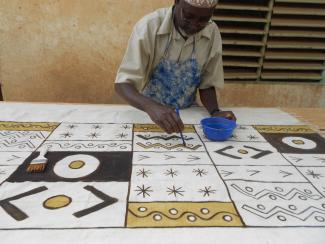
One is immediately drawn to the geometric patterns in Habibou Coulibaly’s indigo and earth-colored textiles. Coulibaly, a textile artist from the Bamana people, is an active member of the Kadiogo Dyers’ Cooperative (Coopérative des Teinturiers et Teinturières du Kadiogo) in Burkina Faso. He works to share his knowledge and bring support to the youth and women of his community through the training, production, and sale of Indigenous art. “My craft is vegetable and mineral dyeing, a very old tradition discovered by hunters of the empire of Mali. This dyeing process is called Bogola Fini in the local Bambara language, meaning ‘result of clay on the fabric,’” he says.
Coulibaly’s art is part of his creative and cultural identity, spanning generations among his family and community. Bogolan is a traditional dye made of tree leaves, barks, grains, and clay. Coulibaly describes the process: “We use leaves, bark, roots, seeds of medicinal trees, and clay, which gives us three essential colors: yellow, which is also an ocher, and black fixative; the mixture of these three colors gives us various shades of colors.”
For the process of obtaining the colors, Coulibaly explains, “We soak the leaves and stems, boil the bark, and ferment the clay all in different containers. We add potassium alum to strengthen the color fastness. We soak the cotton three times in the yellow color, make white patterns with soap paste, and black patterns with clay. Each soaking and drawing is followed by drying. We repeat the process three times. Then the finished piece is washed and treated with alum. The designs we use are masks, signs, and symbols that were already carved on stones or on the walls of our huts. The artists added geometric and decorative drawings.”
Born in Konna in Mali, West Africa, Coulibaly now resides near Ouagadougou, Burkina Faso, with his wife and four children, where he is a Bamanan Knight of the Burkinabé Order of Merit, a national recognition for his work. Of his professional background, he says, “I learned my art from my grandmother in the family workshop. I received other trainings in the family workshops following my visits to my parents in San, Ségou, Koutiala, and Bamako in Mali. In Ouagadougou, I attended training courses in graphic design, in the knowledge of plant-based dyes and textile processes, [as well as] in management, sales, and marketing.”
Coulibaly is an expert in traditional dye processes at the Ouagadougou National Arts and Crafts Center. “As artists, we face the challenge of finding successors to follow our craft because all those who study no longer wish to make the traditional art. It is difficult to source the raw material that has become very rare and more expensive. Financial resources are increasingly inaccessible to artists, making it difficult to produce and market our products,” he says.
Despite these challenges, Coulibaly is committed to his craft: “Art is the beginning of my life. The art of bogolan and indigo is a cultural identity. For me and my family, it is a cultural heritage, a know-how. It is a means of educating and expressing oneself as a continuation of traditions for future generations, and has international dimensions. Art is a profession that allows me to provide for the needs of my family and is a source of pride for my village, reducing unemployment and poverty. Through our cooperative, by organizing and participating in training workshops, fairs, and festival markets, we aim to help young people and women by training them in the production and sale of their products—and we adhere to the spirit of fair trade.”
Reflecting on his experience at the Cultural Survival Bazaars, Coulibaly says, “They offer the opportunity to educate ourselves, to exchange, to share, to give and receive culturally. It is also an opportunity to improve production quality. It is one of the best opportunities to sell and promote our art while creating long term relationships with organizers and artists from around the world.”
ALL PHOTOS COURTESY OF HABIBOU COULIBALY.
Join us at this Winter’s Cultural Survival Bazaars: December 9–10, Cambridge, MA • December 15–17, Boston, MA Visit bazaar.cs.org and facebook.com/culturalsurvivalbazaars for more information.
